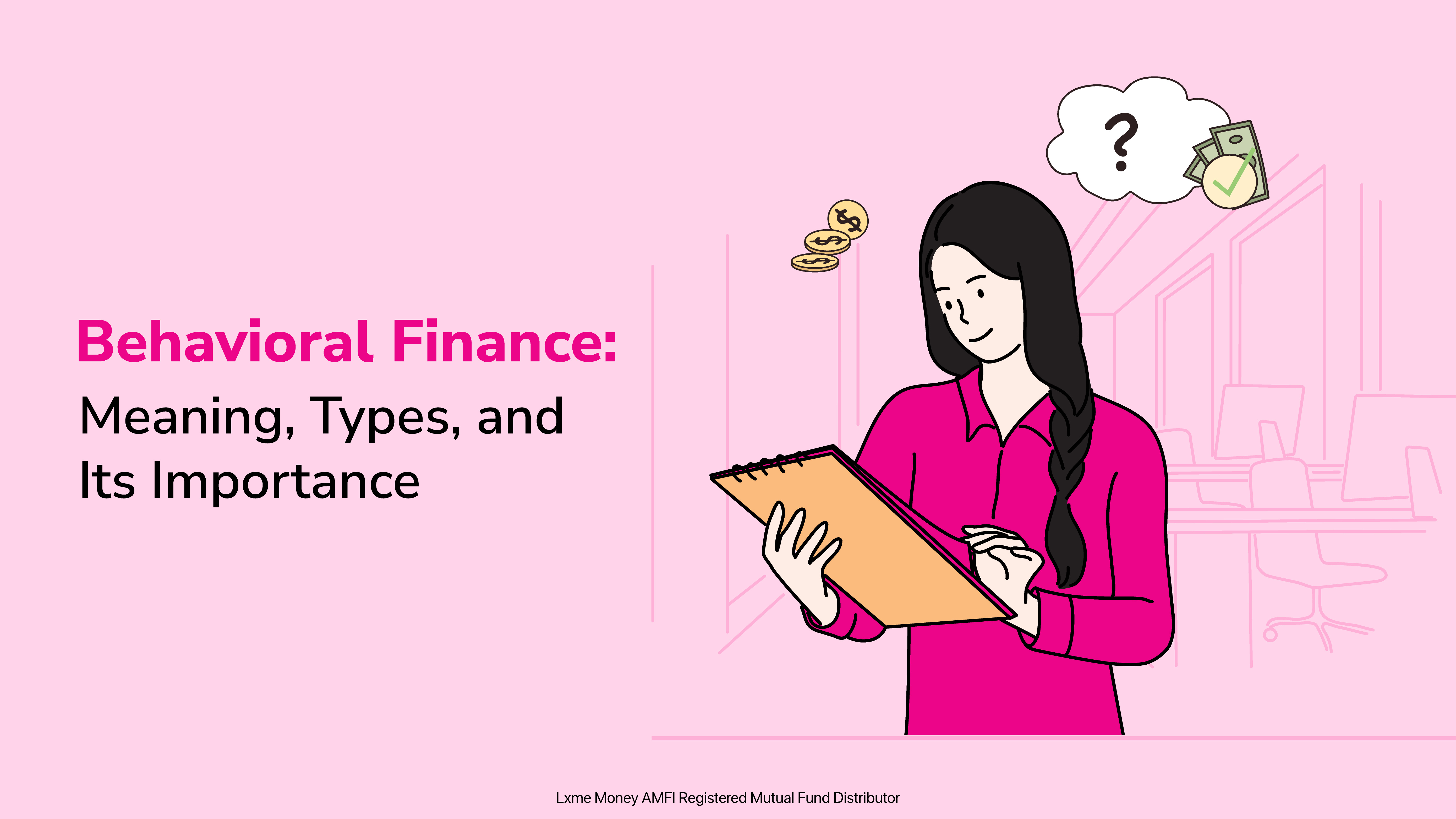Money decisions aren’t just about budgets, investments, or savings—they’re mostly tied to emotions, traditions, and habits passed down through generations. From our parents’ gold investments to the “fixed deposit is best” thinking, financial behavior is shaped by more than just numbers. This is where behavioral finance meaning becomes important. Unlike traditional finance, behavioral investing focuses on how psychology influences our decisions, sometimes in ways that don’t make financial sense.
Ever refused to sell an investment at a small loss, convinced it would bounce back? Or did you jump into a trending investment because “everyone” was doing it? These are classic examples of behavioral finance theories in action. Let’s get into it because understanding this can save you from making expensive mistakes.
What is Behavioral Finance?
In simple words, behavioral finance meaning is the study of how psychology affects financial decisions. It challenges the idea that people always act in their best interest. Instead, it explains why we sometimes make choices that go against our best financial interests.
Take this: Why do so many Indians invest heavily in real estate, even when stocks might offer better returns? Or why do we hesitate to invest in mutual funds but jump into IPOs with FOMO? Financial behavior theory helps answer these questions and guide better decision-making
Key Behavioral Finance Theories and Biases
Several behavioral finance theories explain why we make emotional money decisions. Here are some of the most common ones:
1. Prospect Theory
Losses hurt more than gains feel good. If you find ₹500 on the street, you’ll be happy, but if you lose ₹500 from your wallet, the frustration is much stronger. This is why investors tend to sell profitable stocks too soon while stubbornly holding onto bad investments, hoping they’ll recover.
You can aim for long-term investments through mutual funds with Lxme, as historical data has shown an upward trend in equity markets
Historically, equity has delivered inflation-beating returns in the long term, so you should aim for long-term investments through mutual funds with Lxme, one of the best online investment platforms.
2. Herd Mentality
Herd mentality is one of the most common behavioral finance theories. Think for a second, how many times have you seen people rushing to invest in something just because all are “doing it”? This is why stock market bubbles happen and the reason behind people jumping into crypto without understanding it. Following the crowd isn’t always the smartest financial move.
You can learn about money with Lxme’s resources, live sessions, and community to become confident and make your own financial decisions.
3. Overconfidence Bias
Ever heard someone say, “I know how to time the market” or “I have a gut feeling this stock will take off”? Being confident is great, but being overconfident can lead to risky investments and overtrading—often with painful results.
4. Loss Aversion
Most people fear losses more than they appreciate gains. This is a classic case of behavioural finance theory at work. That’s why so many Indians prefer to keep cash in their savings accounts rather than invest, even when inflation slowly erodes its worth.
5. Anchoring Bias
We tend to base financial decisions on the first number we hear. For example, if someone tells you that a flat in Mumbai was worth ₹1 crore last year, you might refuse to buy it for ₹90 lakh now, even if market trends suggest prices will drop further.
6. Confirmation Bias
We love hearing things that confirm what we already believe. If you think gold is the safest investment, you’ll seek out news that supports it and ignore reports suggesting mutual funds have given better returns in the long run.
Why is Behavioral Finance Important?
Understanding financial behavior theory helps us make smarter choices with money. Here’s why it matters:
1. Helps Investors Make Rational Decisions
Knowing your biases means you can stop making impulsive decisions and dodge the behavioural finance theory. Instead of panic-selling during market dips, you’ll focus on long-term growth. You can also start investing consistently through SIPs with Lxme.
2. Improves Financial Advisory Services
Financial planners in India need to do more than just suggest investments—they need to help clients manage their emotional reactions to money. Recognizing biases allows them to offer better advice.
3. Enhances Financial Planning for Couples
Once you understand behavioral investing you will also know why you hesitate to invest or why you tend to overspend, you can take steps to change these habits and build a financial secure future.
4. Strengthens Market Stability
When more investors make rational choices instead of following hype, we get fewer stock market crashes caused by herd behavior.
Applying Behavioral Finance in Everyday Life
You don’t have to be a pro to benefit from behavioral finance. Here’s how it applies to everyday life:
- Investing: Instead of reacting to the market, focus on long-term wealth creation.
- Spending: Recognise emotional spending triggers – like shopping to feel better – and set budgets to stop unnecessary spending. You can use Lxme’s Budget Planner for this.
- Saving: Automate investments so emotions don’t get in the way of shared financial goal management.
- Debt Management: Be aware of anchoring bias when negotiating loans or repayment plans.
Money decisions are personal, but they don’t have to be impulsive. When you understand behavioral finance meaning, you can take control of your financial future with confidence and clarity. Start today and watch your wealth grow the right way!
You can also read our blog on the role of education in women empowerment.
FAQs:
What are some common behavioral biases in finance?
Herd mentality, loss aversion, overconfidence, confirmation bias, and anchoring bias. Each affects how we invest and make financial decisions.
How does behavioral finance affect investment strategies?
Behavioral finance helps us understand our emotions and make smart financial decisions for the long term.
Why is behavioral finance important for financial professionals?
Financial advisors need to understand their clients’ money psychology. By addressing emotional decision making they can guide people to better investment and saving strategies.
Can the principles of behavioral finance be applied to personal money management?
Why not! Understanding biases will help you control impulsive spending, save consistently, and make informed investment decisions instead of reacting to market changes.
Further read:












